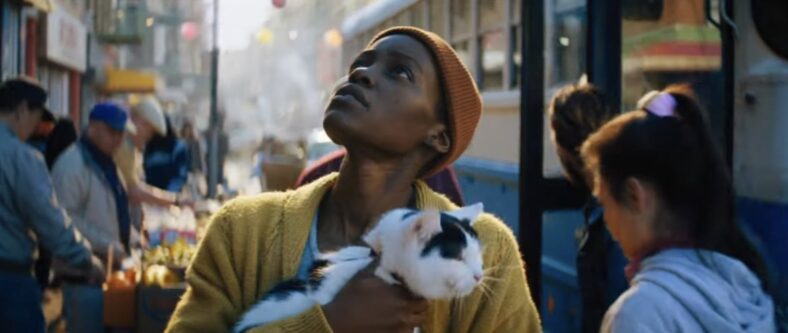
From the trenches of actual life, it’s straight-up laughable to see the Black lady in a horror film decreased to simply “Woman, are you okay?” after our counterparts are stabbed within the leg by some nameless deranged killer. Thoughts you, we’re additionally bleeding. The gathering of the collective eye-roll, and sucking our enamel in unison on the demise of Alfre Woodard in Annabelle is only one instance of what units change in movement for our most popular style of artwork.
Sacrificing ourselves so a white household can reside in concord isn’t price a standing ovation; survival is. We’re beginning to see a shift in the way in which our characters and their tales are written with right now’s Black last women turning into extra sincere to our tradition. For those who couldn’t inform already, we’re residing via a Black horror renaissance, and the long run does look promising.
Black Ladies Have At all times Finished The Work
American Black ladies traditionally have been left to liberate and shield themselves. When the women gathered for change on the Seneca Falls Conference in assist of girls’s rights in 1848, that didn’t embody us. The examples are ample, however the backside line is that the systemic failure to acknowledge and shield brown pores and skin has molded a tradition of girls who’re as sturdy as they’re delicate. That’s how we survive. Mirroring this on display screen is staying true to the traits and values born out of a mix of affection and strife. Don’t get it twisted.
Cease making your self upset by wanting backward. Transfer previous your frustrations with how The Craft decreased Rachel True’s character to simply “racism”. As an alternative admire the present horror media that emulates an escapist portrait of how Black ladies have and can proceed to outlive.
Nuanced Resilience in A Quiet Place: Day One

There’s a high quality of resilience amongst Black ladies. It’s a trait that provides us an unstated understanding of what we deserve. Even when survival isn’t the tip aim, our dedication to peace is simply as essential. Lupita Nyong’o is Samira in A Quiet Place: Day One, a most cancers affected person in hospice as aliens convey on the apocalypse. By means of the chaos, she meets Eric (Joseph Quinn), a conventionally polished white man who would sometimes be the movie’s hero, serving to the poor dying lady. However that’s not the case right here. Sam has already come to phrases with leaving Earth and made her plans for a departure that may make her really feel most snug. What she’s determined for herself is precisely what she’s going to get, ideally with none exterior assist.
The attractive factor about this prequel is making Sam, who’s marginalized in some ways, the instructor, the coed, and the hero by highlighting the complexity of the Black lady. She’s capable of save Eric by crossing a private boundary, and (bear with me) permitting him to assist her. In return, she’s granted unwavering assist within the destiny she’s chosen for herself. That also counts as resilience.
Energy isn’t all the time doing it alone. Energy can be understanding when and who to obtain assist from, so long as the imaginative and prescient is revered. If Sam had not allowed Eric to assist, he won’t have internalized what survival really means, and wouldn’t have gained the drive to outlive himself.
Letting Black Ladies Make Actual Errors In Horror

Black ladies’s energy is usually a skinny tightrope to stroll; tread too far and also you’ll find yourself within the forbidden lands of stereotype, just like the “Robust Black lady” trope. However actual ladies make errors. It’s the steps taken after these errors which are essential to take note of. Take Tess for instance, from Zach Cregger’s Barbarian. Tess, performed by Georgina Campbell, is a candy and delicate character who makes the questionable choice of agreeing to share a double-booked house with a stranger. Then, on high of that, she decides to peek into the basement.
When held hostage by an entity that doesn’t play by any widespread rulebook, Tess exhibits how solution-oriented she is by observing the risk and appearing accordingly. Marginalized individuals reside in a world the place giving in to intuition can simply come again to chunk. Screaming for assist would possibly make the state of affairs worse relying in your front-facing id. It’s simple for me to consider that this shared expertise grants Tess her life and freedom, whereas the boys who give precedence to intuition over crucial pondering lose their lives.
Consider Ladies, Particularly Black Ladies

There’d be fewer casualties in Barbarian if the police had believed her cries for assist. J.D. Dillard’s Sweetheart exhibits us the same state of affairs, however this time on a desert island. The horror movie follows Kiersey Clemons as Jenn, surviving on a distant island with few sources whereas dodging an aquatic monster. After a number of days alone, her boyfriend Lucas (Emory Cohen) and good friend Mia (Hanna Mangan Lawrence), wash up on the seaside. However their arrival isn’t precisely an excellent factor, as their reliance on Jenn’s resourcefulness provides extra battle to an already-dired state of affairs. A mixture of white privilege and sophistication disparity influences how snug they’re dismissing Jenn’s warnings of hazard on the island. Nothing like some good ol’ gaslighting to make your Black feminine protagonist really feel loopy.
We all know in actual life that this habits isn’t “regular”, however it’s accepted. American society is just too snug stealing from the cultural and neighborhood efforts of Black ladies whereas labeling us as untrustworthy or troublesome. I see the hashtags on Instagram #BelieveWomen. Let that embody all ladies, no matter race, class, or historical past of trauma. It’s one factor to outlive an ordeal, however one other to be believed by the general public to make sure we don’t grow to be a monolith.
Dillard provides us a societal warning all through Sweetheart by exhibiting the (exaggerated) penalties of selecting to not consider the phrases and actions of Black ladies. It’s not sufficient to simply admire our efforts—you’ve obtained to consider us, too.
Categorized:Editorials


